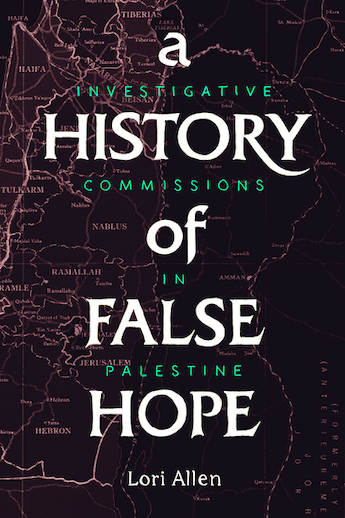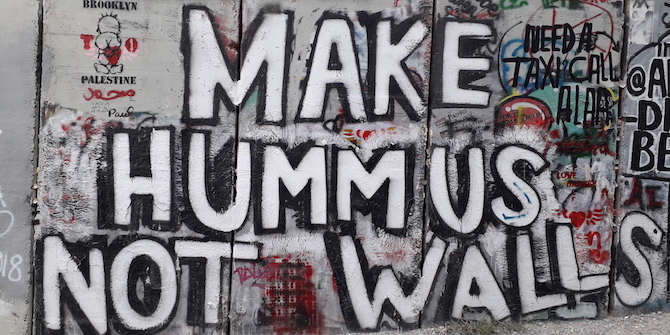by Jim Muir
Since Palestine first began emerging as a major centre of world crisis a hundred years ago, dozens of commissions of inquiry, fact-finding missions and other delegations have been despatched to the region to try to get to the bottom of the conflict, establish the reality of what was going on, and sometimes to offer proposals for a resolution – or simply be seen to be trying to do something. Needless to say, they all failed. Focusing on half a dozen of the most important missions with a sharp anthropologist’s eye, Lori Allen highlights the reaction of Palestinian opinion to the ostensible opportunities offered by the commissions, and the hopes they raised and dashed. Through all the upheavals on the ground, and huge changes in the global political environment reflected in the composition and remit of the missions, the Palestinians remained attached to the concept of international law, and would likely be called on to put their case time and again in years to come.
O tempora, o mores…One of the most interesting results of looking at a century of history through the particular optic of inquiry commissions is the light it sheds on the mutating ethos prevailing in the international arena, and the state of play in the Middle East region and Palestine itself, as the various stages of the tragic drama inexorably unfolded.
First to come under the spotlight was the King-Crane Commission, despatched to the region in the summer of 1919 as Woodrow Wilson tried to infuse his notions of self-determination and liberal governance into a region on which the imperial powers, Britain and France, were determined to keep their grip. The Paris peace conference was under way, bent on deciding the fate of the vast regions emerging from centuries of Ottoman rule, and Wilson’s idea was that consulting the peoples concerned would better inform the American position in those talks.
If Wilson’s own position – described within his own circle as ‘vague phrases and beautiful ideals’ which were certainly not shared by the imperial powers – illustrated something of the ferment going on in the western world over concepts of governance in the post-Great War period, it coincided with a huge upsurge of debate within the Arab world, where the concept of self-determination was taking root, and where Wilson’s propositions were taken seriously.
A new international legal order appeared to be at hand, and the Arabs were eager to be part of it. In Palestine and elsewhere, they turned out in droves to welcome the American mission, and jostled to make their voices heard; Allen unearths and echoes many of them, drawing largely on Arabic sources.
The Commission was impressed, and its recommendations were that there should be a cap on Jewish immigration to Palestine, and that the region should form a single Arab state under King Faisal, with the US as the mandatory power guiding the process. This virtually coincided with the demands of the Arabs, deeply and justifiably distrustful of Britain and France and their cynical designs.
But its report never saw the light of day, colliding with the political realities of the time, a pattern that was to run through all subsequent missions. The newly formed League of Nations (dubbed the ‘League of Empires’ by a Palestinian critic) had decreed Palestine to be unready for independence and in need of the protection of a mandatory power. Wilson himself (by now ailing) quietly went along with a State Department determination that Britain and France were best placed to play the role of mandatory powers. And so the British, having promised the Arabs an independent state if they joined the fight to bring down the Ottomans, and the Jews a home in Palestine, and having secretly divided the region into spheres of influence with the French, took over in Palestine.
The spirit of the times was well encapsulated by one of the many telling quotes woven into Allen’s narrative. At the Paris peace conference, the British Prime Minister, Lloyd George, predicted that Arab and Jew in Palestine were ‘going to grow up into two troublesome chickens; the Jew virile, brave, determined, intelligent; the Arab decadent, dishonest and producing little beyond eccentrics, influenced by the romance and silence of the desert.’ That strand of patronising racism was still alive three decades later when the British liberal socialist Richard Crossman, writing letters home to his wife as Arab representatives were talking to the Anglo-American Committee, described them as ‘poor, inefficient, idle, corrupt political leaders who are wasting our time’, while another committee member described the Arabs as a ‘set of charming degenerates’.
By the time the Peel ‘Royal Commission’, a purely British affair, was sent to Palestine in 1936, the mood had changed completely. Far from vying to offer their testimonies, the Palestinians boycotted the commission for six turbulent months and only relented under outside Arab pressure. Five previous commissions had already been and gone since King-Crane, leaving nothing. Jewish immigration had flourished under British rule, doubling numbers from 175,000 in 1931 to 370,000 in 1936. The Palestinian Arabs were in open revolt, including armed action.
Like all other commissions, the Peel findings were never implemented. They recognised the contradictory nature of the British mandate’s remit, and broke new ground by recommending the country’s partition, with the Jews (who then owned a tiny fraction of the land) to be given the best bits. Nothing came of it, and the revolt went on for two more years of repression and upheaval.
It was only another ten years before the next major commission came along – the Anglo-American Committee of Inquiry of 1946 – but by then the landscape and the international mood had again changed dramatically. Sympathy for the suffering of European Jewry had become the touchstone of international liberalism, and there was little the Arab side (with the redoubtable Albert Hourani to the fore) could say to convince the committee that an independent democratic Palestine would provide a safe home for a reasonable number of Jews, but that Palestine should not be made to pay the entire price for the sins of European anti-Semitism – or to persuade the US itself to open its own gates to a flood of Jewish refugees, which it failed to do.
The committee tried to observe balance by declaring that neither Jew nor Arab should ‘have dominance’ in Palestine, but recommended that a further 100,000 Jewish immigration permits should be issued, which would have a massive political and demographic impact. It failed to alter the course of events, but helped crystallise and give centre stage to international sympathy for the plight of the Jews; and in failing, it cleared the way for the problem to be dumped on the nascent United Nations.
The UN itself despatched a Special Committee on Palestine (UNSCOP) the following year which was fully boycotted by the Palestinians but feted by the (not yet Israeli) Jews, and which prepared the way for UN General Assembly resolution 181(II) of 1947 proposing the partition of Palestine, with 57 percent of the land being given to the Jews.
The ensuing war which saw the emergence of Israel and the displacement of the bulk of the Palestinians led to another UN resolution insisting on the refugees’ right of return, which has been repeated annually but never implemented. Similarly, UN Security Council resolution 242 of 1967, after the six-day war through which Israel had occupied the rest of Palestine and the Golan Heights, enshrined the principle of the inadmissibility of the acquisition of territory by force, also never implemented.
Both these principles have been endlessly repeated and are pillars of international law, prompting trenchant critiques by Allen about international law as a belief system, and the vagaries and mutations of the international liberal order.
The liberation movements and decolonisation processes of the 1960s and 1970s brought a whole new mood to the international arena, with the UN as the main forum and the Palestinians experiencing a considerable turnaround in international sympathies and perceptions of their victimhood. In 1968, the UN set up a Special Committee to Investigate Israeli Practices Affecting the Human Rights of the Population of the Occupied Territories (UNSCIIP), which investigated and reported annually up until the present time – of course, with no effect on the course of history. The General Assembly meanwhile recognised the ‘inalienable rights of the Palestinian people’ and gave the PLO observer status at the UN, and awareness of the issue was further boosted by the outbreak of the first Intifada in 1987.
The Mitchell committee, commissioned by Bill Clinton as the Oslo peace process was running into the sands in late 2000 to explore ways of getting it back on track, was outside the UN framework, but engaged deeply in what Allen calls ‘democratic listening’, hearing articulate and effective Palestinian submissions as well as the Israelis.
But Allen argues that its ‘balanced compassion’ reinforced (not for the first time) a false equivalence: ‘The result of democratic listening in this liberal communicative framework was an effective erasure of Palestinians’ history being subject to a settlercolonial takeover of Palestine.’ Its report also died the death, swept away by the advent of Ariel Sharon as PM in Israel and GW Bush as US president.
The focus then shifts to a series of UN investigations into Israeli actions in the territories, including the attack on Jenin refugee camp in 2003, on Beit Hanoun in Gaza in 2006, and the massive ‘Cast Lead’ assault on Gaza in December 2008 to January 2009, in which some 1400 Palestinians (many civilians) were killed. In the latter case, the committee headed by Richard Goldstone caused a furore by daring to suggest that the Israelis (as well as to a lesser degree Hamas) may have committed war crimes. Its report was hotly debated (and roundly denounced by the US House of Representatives) but of course got nowhere.
For Allen, these latter exercises in ‘ethical listening’ raised at least some hope for the application of international law – a hope that remains unfulfilled. The irony for the Palestinians is that the world’s appreciation of their plight has grown in inverse proportion to its ability to do anything about it, given the waxing of US-enabled Israeli hegemony.
If the Palestinians had any illusions about international law being some sort of objective deus ex machina that would intervene to set things right, they lost them long since to an awareness of how power really works. And yet they keep coming back to the commissions, perhaps out of forlorn hope that they might somehow eventually give them the justice they seek, but also because they find there a unique platform to address the world, and which helps them feel that the world cares. And, no doubt, they will come again.







